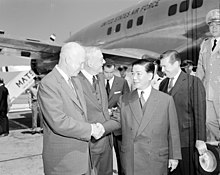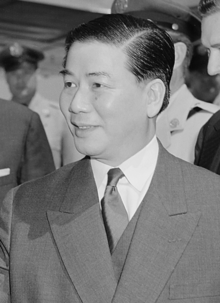Ngô Đình Diệm
Ngô Đình Diệm ( Hán Nôm 吳廷琰 , actually Jean-Baptiste Ngô Đình Diệm ; born January 3, 1901 in Huế ; † November 2, 1963 in Saigon-Cholon ) was the first President of the Republic of Vietnam from 1955 to 1963.
Life path
Youth and education
Diệm was born in the city of Huế , the ancient capital of the Nguyễn dynasty . The Ngô family belongs to the Catholic nobility of Vietnam . One of his brothers, Pierre Martin Ngô Đình Thục , was Archbishop of Huế , another brother, Ngô Đình Nhu , who was one of his closest advisers, was considered a supporter of personalism . Diệm was an ardent nationalist and anti-communist. At a young age he became a civil servant in the French colonial administration.
Cabinet post
In 1933 he became Minister of the Interior under Emperor Bảo Đại , but resigned only a few weeks later after a dispute over competencies with the French. During the Japanese-French administration , he was pursued by the French but protected by Japanese military intelligence. At times he was hiding in 1943 in the house of the Dainan Kōshi CEO . In July 1944 he went to the Japanese consulate in Huế , fearing that he would be arrested by the French. The Japanese secret police Kempeitai , at the instigation of Consul Ishida Masao , flew him with a military machine to Saigon to the headquarters of the Japanese 38th Army . There he managed in August that Cong Des's two sons were also brought to safety in Bangkok, where they cooperated with Tran Trong Kim . In Cong De's shadow cabinet, a leading position was planned for him. The Japanese continued after the French were disarmed on 9/10. March 1945 surprisingly continued on Bao Dai.
French recolonization
In 1946 armed conflicts broke out between the numerous nationalist groups, which, especially in Tongking , which was liberated by China, increasingly took power until the arrival of the French in March 1946. After the August Revolution , he refused to join the Ho Chi Minh government and went into exile in the United States. There he met influential politicians, with whom he made a name for himself as an anti-communist and anti-colonial Vietnamese nationalist. These convinced the US Secretary of State John Foster Dulles in 1954, after the end of the Indochina War and the withdrawal of the French, that Diệm was the suitable Prime Minister of South Vietnam .
President of South Vietnam
According to the result of the negotiations at the Geneva Conference of 1954, free elections should have been held in all of Vietnam by 1956 and then reunification. However, Diệm agreed with the United States to prevent this, since free elections would have led to a victory for the communists. Foreign Minister Dulles publicly called on Diệm to stand up for free elections. Behind the scenes, he was assured that the American government viewed the all-Vietnamese elections as a grave threat. De jure , the position taken was that the South Vietnamese government was not represented at the conference and was therefore not bound by the resolutions.
His style of government was considered authoritarian. First he turned brutally against the river pirates of the gang boss Bình Xuyên , who exercised police violence among the French in Saigon and who were allowed to finance themselves through smuggling opium , prostitution and blackmail . The six-day house-to-house war in Saigon-Cholon in May 1955 left 500 dead, 2,000 injured and 20,000 homeless. Then he also took action against the sects of the Hoa Hao and the Cao-Daists . The Americans rewarded his success with generous financial donations, through which Diệm was able to cover about 80% of the state budget. His brother and advisor Ngô Đình Nhu allowed the opium trade again to improve the state finances, using the gangsters who operated the Air Opium companies.
In 1955, Diệm was elected president in a rigged election (in Saigon he achieved 135% of the votes cast) and at the same time abolished the monarchy with the unpopular former Empire of Vietnam from Bảo Đại . With the annihilation of the imperial guards and militias loyal to the emperor, the nationalist forces of Vietnam were considerably weakened.
Diệm consolidated his rule by giving influential positions preferentially to relatives and by building two secret services that spied on one another. He began a brutal campaign not only against communists but also against other actual or supposed political opponents. According to independent estimates, 150,000 people were imprisoned and 12,000 people were killed between 1955 and 1957 alone.
Despite everything, it was still considered an alternative to Ho Chi Minh in the US public. It was hoped that it could develop into a charismatic antithesis. The Eisenhower administration was of the power-political view that, in view of its anti-communist stance, one should overlook the atrocities of the regime and the massive corruption. South Vietnam remained completely dependent on the USA and could not survive without its help.
His rejection of a land reform , which the USA also considered necessary, contributed to Diệm becoming increasingly unpopular among the population. Forced resettlement of the rural population in fortified villages, the so-called Taylor-Staley Plan , was intended to withdraw supplies from the Viet Cong (NLF). Rather the opposite was achieved - Diệm also drove those Vietnamese who had previously been hostile to socialism into the arms of the NLF. When the convinced Catholic Diệm, supported by almost two million Catholics, carried out a Christian conversion campaign, the Buddhists of Vietnam also called for an overthrow. Diệm, who had meanwhile turned against him by almost all relevant groups, reacted with arrests and executions .
The American Vice President Lyndon B. Johnson described Diệm in 1961 as " Winston Churchill of Southeast Asia". Gradually, however, a change of opinion began on the side of the Americans, who continued to support him, as it became apparent that the lack of democratic structures, the lack of land reform and the rampant corruption in Diệm's government were damaging the advancement of South Vietnam.
Opposition and coup

In 1963, on the occasion of Buddha's birthday , Buddhist monks also displayed Buddhist flags despite the ban . As a result, Diệm had his elite troops shot into the unarmed crowd, and nine people died. There were further demonstrations, which were also bloodily suppressed. The monk Thích Quảng Đức burned himself to death in protest in front of the international public. Students joined the protests and the army was also dissatisfied. Diệm's cynical comments about this, but especially those of his wife, also put his partners in Washington in distress.
The Buddhist crisis convinced the Kennedy administration , now in power in the USA , that Diệm at the head of South Vietnam was not the right person to continue to ensure stability in the interests of Washington. Kennedy appointed Henry Cabot Lodge as the new ambassador in Saigon with the task of bringing Diệm "to his senses" or looking for an alternative to him. Documents that have since been released show that American intelligence services actively brought about the overthrow and murder of Diệm. Until then, it was claimed that Lodge had only signaled to a few disaffected military officers that the US had no objection to a coup.
On November 1, 1963 there was a military coup by ARVN generals around Dương Văn Minh . It was only when the presidential palace was surrounded and Diệm's elite units were disarmed that Diệm declared his readiness for reforms and tried desperately and in vain to win the support of the US ambassador Lodge. He pretended not to be able to interfere in the internal affairs of South Vietnam. Diệm and his younger brother Ngô Đình Nhu were initially able to escape through underground secret passages. However, they were later picked up by search parties and murdered. The next day, the two bodies were found riddled with bullets and mutilated in a van.
The decision of the White House to sacrifice the dictator Diệm is said to have been due to the fact that he recently wanted to establish direct contact with Ho Chi Minh in order to force the USA out of the Vietnamese civil war. The American leadership expressed its alleged outrage over the killing of Diệm.
Kennedy had sent his close confidante Torby MacDonald to South Vietnam, who at a meeting with Diệm had urgently advised measures against rampant corruption in his government. He had also warned him about possible rebels and recommended that he go to the secure US embassy . However, Diệm was blind to what was going on in his own country and therefore ignored this warning.
Contrary to the hopes of the US government, however, no better successor could be found. After Diệm's death, there was no longer a stable government in the country that could be established for a long time.
literature
- Frances Fitzgerald: Fire in the Lake: The Vietnamese and Americans in Vietnam. Boston 1972, ISBN 0-316-15919-0 , ISBN 0-679-72394-3 , ISBN 0-316-28423-8 .
- Marc Frey : History of the Vietnam War: The Tragedy in Asia and the End of the American Dream. Munich, 8th edition 2006, ISBN 978-3-406-45978-8 .
- Seth Jacobs. Cold War Mandarin: Ngo Dinh Diem and the Origins of America's War in Vietnam, 1950–1963. Lanham 2006, ISBN 978-0-7425-4448-2 .
- Robert Mann: A Grand Delusion: America's Descent into Vietnam. New York 2001; ISBN 0-465-04370-4 , ISBN 0-465-04369-0 .
Web links
Individual evidence
- ^ Bernard B. Fall : The Two Vietnams: A Political and Military Analysis Greenwood Publishing Group, Second Revised Edition 1967, ISBN 978-0-9991417-9-3 , p. 235
- ↑ Peter Scholl-Latour : Death in the rice field . Deutsche Verlags-Anstalt, Stuttgart 1979, ISBN 3-421-01927-4 , pp. 86-90
- ↑ Marc Frey; History of the Vietnam War; Beck, Munich 2000, ISBN 3-406-45978-1 , p. 47
- ↑ Frey (2000), p. 48
- ↑ Frey (2000), p. 51
- ↑ Scholl-Latour (1979), pp. 87 f.
- ^ McCoy, Alfred; The Politics of Heroin; New York 1991 (rev. Ed .; orig. 1972); ISBN 1-55652-126-X
- ↑ Frey (2000), p. 60
- ↑ U. a. the Pentagon Papers ( full text )
- ↑ Frey (2000), p. 97 f.
- ↑ Scholl-Latour (1979), p. 106
- ^ Larry J. Sabato: The Kennedy Half-Century. The Presidency, Assassination, and Lasting Legacy of John F. Kennedy . Bloomsbury, New York 2013, p. 124 f.
| personal data | |
|---|---|
| SURNAME | Ngô Đình Diệm |
| ALTERNATIVE NAMES | Jean Baptiste Ngo Dinh Diem |
| BRIEF DESCRIPTION | first president of South Vietnam |
| DATE OF BIRTH | January 3, 1901 |
| PLACE OF BIRTH | Huế |
| DATE OF DEATH | November 2nd, 1963 |
| Place of death | Saigon Cholon |


